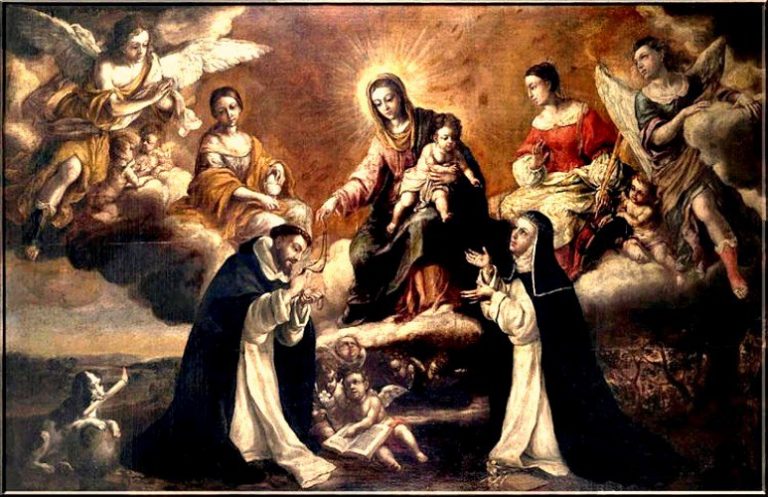The Feast of St. Dominic

1 Cor 2:1-5: When I came to you, brethren, I did not come proclaiming to you the testimony of God in lofty words or wisdom. For I decided to know nothing among you except Jesus Christ and him crucified. And I was with you in weakness and in much fear and trembling; and my speech and my message were not in plausible words of wisdom, but in demonstration of the Spirit and of power, that your faith might not rest in the wisdom of men but in the power of God.
Almost exactly eight hundred years ago, St. Dominic founded the Order of Friars Preachers in order to preach against Albigensianism, a heresy that claimed the God of the Old Testament was different than the God of the New. Today, we’ve all heard of the Order of Preachers, probably under the name Dominicans, but it’s rare to hear about the Albigensians.
St. Dominic carried out his mission well.
The story behind Dominic’s road to founding an order that has lasted almost a millennium began even before he was born. According to tradition, Dominic’s mother, Blessed Jane of Aza, had a dream of a dog leaping out of her womb carrying a torch in its mouth, and with this torch set the world on fire. This dream gave a hint of Dominic’s vocation to set the world on fire with God’s Word.
He was born in Caleruega, Old Castile, Spain, sometime after 1170. On completing his studies in theology at Palencia, he was appointed (about 1196) a canon of the cathedral chapter at Osma, and in 1201 he was chosen prior of that cathedral community.
He accompanied Osma’s bishop, Diego de Azevedo, on two royal embassies to northern Europe, and during that time he became acquainted with the needs of the Church, especially in the Languedoc region of France, where the Church was severely threatened by the Albigensian heresy. To assist the Church in her present grave need, Dominic and several other priests were commissioned by Pope Innocent III (1198–1216) as itinerant preachers to save the French faithful from the heretics. Dominic preached throughout southern France for a period of about eleven years (1206–17).
In 1214, he conceived the idea of forming a religious community to continue this important work of preaching, so he and his companions went to Toulouse in 1215, and there they formed what eventually came to be known as the Order of Friars Preachers, more commonly called Dominicans. Dominic only had six more years to live, but during that time he saw his order expand into France and Spain, Italy, Germany, and Poland. The cities of Paris and Bologna, both university centers, became the principal bases for the order’s growth.
In 1221, after participating in the order’s second general chapter in Bologna, Dominic became ill and died there on August 6, 1221. He was canonized by Pope Gregory IX in 1234.
Today’s blog is powered by Verbum, software designed to make it as easy as possible to learn more about the faith. Learn more about the St. Paul Center Verbum Libraries here.
Tylenda, J. N. (2003). Saints and Feasts of the Liturgical Year (pp. 156–157). Washington, D.C.: Georgetown University Press.
Catholic Daily Readings. (2009). Bellingham, WA: Faithlife.